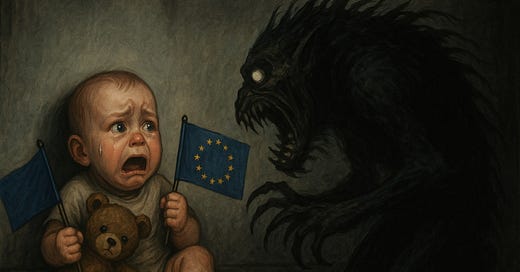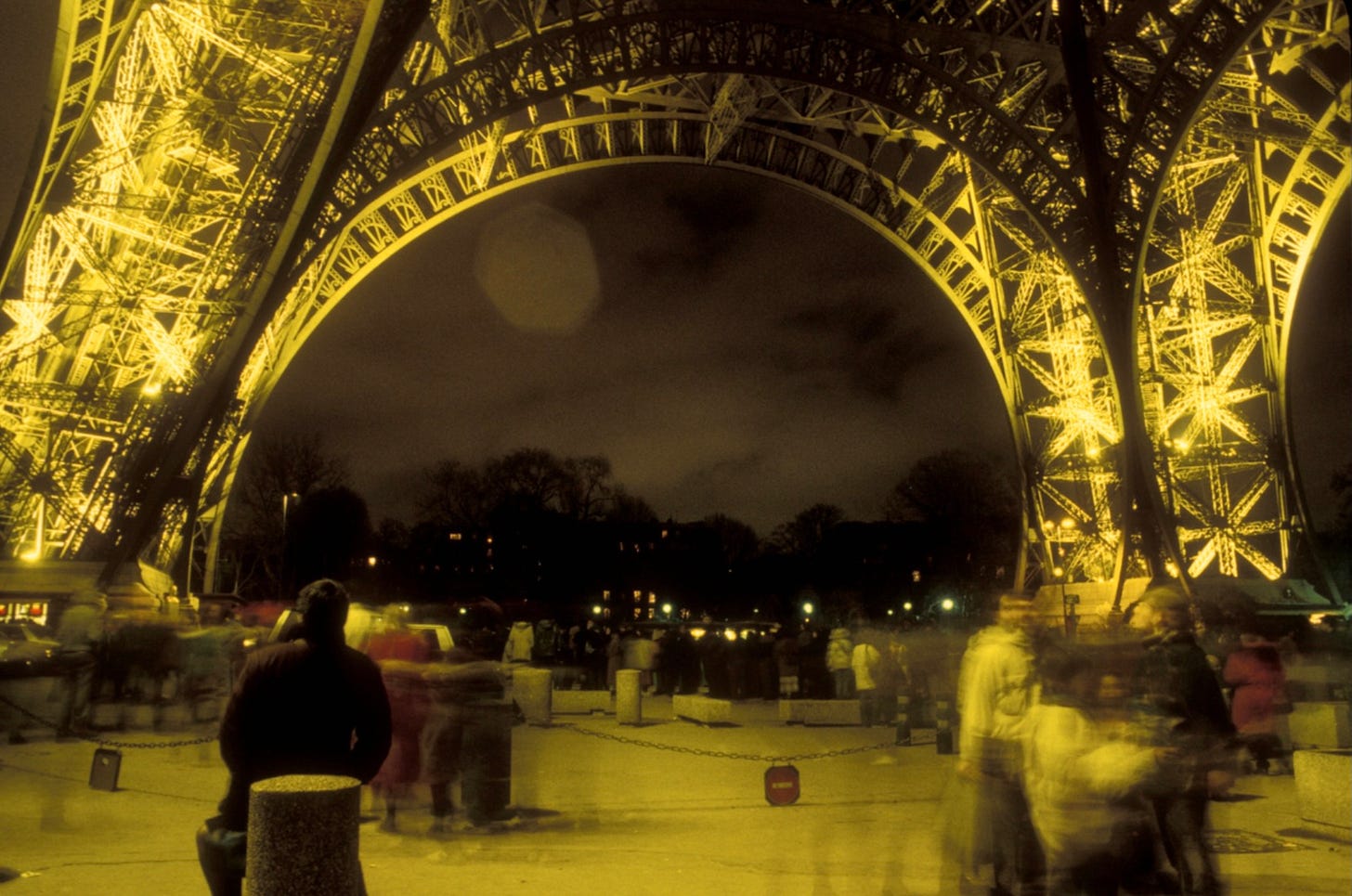Welcome to Common Sense and Whiskey, a short, sharp, weekly look at the world out there, delivered free to subscribers on Fridays.
Today we talk frightened politicians and corruption in government, and wonder what’s to be done. Also, Germany has an unusual problem: too much defense money to spend.
Tomorrow I’ll send you a couple thousand words wrapping up the June 24-25 NATO summit in the Hague, and discussing the kind of leaders running the United States and Europe right now.
Already this morning (before it got too hot) Atlanta hosted what they claim is the world’s biggest 10k race, with 60,000+ participants. Here in town, it’s the traditional kickoff to 4th of July festivities. Happy 249th birthday, and have a good weekend!
If you find CS&W useful, please consider subscribing for Friday newsletters and other occasional reports. It would be great if you could contribute, but there are no paywalls here—you can always read the whole column.
Let me know what you think. Now, let’s get started.
•••••
TIMIDITY IN GOVERNANCE: Staff at the BBC are said to be ‘ashamed’ that a live program from the UK’s big Glastonbury summer festival broadcast a duo from Ipswich chanting ‘death to the IDF’ over last weekend.
Yes, it’s a crude and inappropriate chant (although bands get attention by being shocking—that’s what bands do), and the BBC is funded by a TV license fee paid by UK households that watch or record live TV or use BBC iPlayer.
The fee is mandated, assessed, collected and enforced by the government, so sure, the government might feel the need to strong arm the BBC into being ‘ashamed’ that its airwaves (inadvertently) became a vehicle for hate speech against the Israeli Defense Force.
Note, though, when the conversation drifts into certain more political areas, how timid governments become, and not just the UK. Notice how all Western governments shrink from condemning the daily violence against civilians in the Gaza Strip—violence directed by the government that fields the IDF.
What Western government has had the temerity to declare for the record that the IDF is killing more Gazan civilians than just possibly might be completely necessary? Is that a brave thing to say? For governments, it looks like it is.
European governments are plainly afraid of the American president, too. The NATO summit week before last is a case in point (Watch your email tomorrow—I’ll send subscribers a new column about that). Right now, right this moment, is an obvious time for the European allies to develop an urgent plan to stand their defense up on their own, and do what they can to coordinate with the Americans, who are making no secret that they’re about to pull some of their military back from Europe.
Instead of setting up working groups with the Americans to try to coordinate and smooth out the American withdrawal, NATO seems afraid to bring it up. At the NATO summit they elected to ignore the whole issue, in order not to spoil Donald Trump’s dinner with His Majesty King Willem-Alexander of the Netherlands.
NATO governments are afraid to upset Donald Trump. Many Western governments are afraid to cross the Israeli leader, Benjamin Netanyahu. It’s a trend. Call it cowering before the corrupt.
GERMAN DEFENSE: Some voices in eastern Europe, in countries close to Russia’s war on Ukraine, opposed the appointment of NATO Secretary General Mark Rutte, who took office last fall. Those Eastern critics preferred a NATO leader who would move fast and break things. They were looking for less process and more action against what they perceive as an immediate Russian threat.
Bureaucracies like NATO and its member countries do like procedure. Consider this story about German arms procurement. The Financial Times wrote last weekend that:
“After Germany’s new government this week granted defence minister Boris Pistorius a staggering €650bn for the next five years to overhaul the country’s long-neglected armed forces, his main challenge will be spending it.
Pistorius must grapple with a procurement bureaucracy that once took seven years to select a new main assault rifle and more than a decade to procure a helmet for helicopter pilots.”
•••••
A NEW ERA? REALLY? If, as Timothy Garton Ash writes in the Financial Times, “Europe is in the early years of a new era,” it’s fair to say that new era began with Russia’s attack on Ukraine in 2022.
It’s true enough that what dynamism there is in the transatlantic relationship in 2025 is on the European side, but that didn’t come at Europes’ instigation. Donald Trump says the United States has been taken advantage of and seeks redress. Europeans have been forced into crafting a reaction.
They start with some strengths. By far and away, Europe leads America in regulation of Big Tech and data protection. On environmental protection, the EU Emissions Trading System is the world’s largest carbon market and has been in place since 2005. And with the challenge Donald Trump brings to NATO, the future of European defense is in Europe’s hands.
Garton Ash wrote, “In the best case, building up European power will require a negotiated transition, or “burden-shifting”, with the US doing less, but still providing key strategic assets.”
He’s right, and the pressure will still be on Euro-budgets and Euro-pols for a sustained period now to live up to their defense commitments. Which has started the wheels of European decision-making grinding, and set off a period of scrambling to get something done. The trick will be to do enough things right, with minimal waste, in time for it to pay off.
In this regard the NATO meeting was a missed opportunity. In rushing to avoid the catastrophe it feared, namely Trump abandoning Europe, NATO wasted months on preemptory damage control.
It worried itself into a frenzy over producing an aspirational document calling for 3.5 percent of GDP in hard defense spending with another 1.5 percent of magical thinking, that will only ever be achieved by a portion of NATO countries, and by a time—2035—when none of today’s leaders will be around to see it.
NATO’s time would have been better spent getting down to business on its most urgent agenda item: replacing the specific American defense capabilities that Europe lacks. Europe’s most urgent needs are no mystery. It most lacks force projection capabilities (heavy lifting of troops, tanks and so forth), integrated air and missile defense, and America’s nuclear deterrent and global intelligence.
Each of these shortcomings can be addressed by a sustained period of serious work, and that ought not be beyond NATO’s capabilities. But the way to get started, is to actually start.
Fortunately, NATOs hand is likely to be forced later this year when the United States announces its long anticipated new European force structure. The US’s ‘Global Force Posture Review’ began early this year, with results likely to be revealed in late summer or early fall.
The United States is widely expected to reduce its troop presence, the size of its administrative and support staff, close smaller outposts and scale back air defense deployments, things like Patriot missiles in Poland and Romania. We’ll see, but this last move should especially concentrate NATO minds around Europe’s screaming need for better missile defense.
There’s also the question of standardization of arms, an easily understood political and practical problem. Politically, all countries are naturally inclined to buy from their own arms producers. But in practice one day on a theoretical battlefield, a French mechanic deployed to Bulgaria shouldn’t be expected to repair German tanks, Swedish jets and Finnish armored vehicles.
While Donald Trump serves out his term selling his branded fragrances, sneakers, watches, guitars and Bibles, as his children’s more egregious engorgement carries on just offstage, now is not the moment to look to the Americans for innovation.
So there’s room here for Europe to take charge of its affairs, and some European leaders have ideas. European Central Bank President Christine Legarde, for example, proposes that the European currency should take steps to begin to challenge the dollar.
It’s all up to European leadership. It’s another opportunity for the continent that never misses an opportunity to miss an opportunity.
FRANCE: Lots of us get discouraged these days about the prospects for our American democracy, what with our newfound national disregard for the rule of law, the current administration’s general meanness and this sudden new wave of corruption and personal enrichment by the first family. Maybe it will make you feel better to consider that we’re not the only ones.
Marine Le Pen, the leader of the highest polling party in France, the far right Rassemblement National, has been convicted of embezzling European Parliament funds as part of a broader scandal involving hiring party staff with EU money. Le Pen was sentenced to four years in prison, with two years suspended and two years wearing an electronic bracelet, a €100,000 fine and she was banned from political office for five years. This calls into question her bid for the presidency in 2027 elections. She has appealed and a verdict in her appeal is expected next summer.
Former Prime Minister François Fillon’s (2007-2012) own recent appeal was denied and he was sentenced last month to a 4-year prison sentence—suspended—for embezzling public funds by making his wife Penelope a fake assistant. He was also fined €375,000 and banned from public office for five years. Fillon also owes the Assemblée Nationale a repayment of €126,167 to cover the costs of one of Penelope Fillon’s contracts as her husband’s parliamentary assistant.
Fillon served as Nicolas Sarkozy’s Prime Minister from 2007 to 2012. Since his own term in office, Fillon’s boss, Sarkozy, has been convicted of corruption and influence peddling, illegal campaign financing and is awaiting a verdict on charges of receiving illicit financing from Muammar Gaddafi’s regime, with charges including concealment of embezzlement, passive corruption, illegal campaign financing, and criminal conspiracy. He’s under house arrest with an electronic bracelet on the original corruption conviction and is banned from public office for at least 3 years, pending the verdict in the Libyan case.
•••••
If you’re reading this as an email, your provider may clip this article before the end. Try clicking on ‘view entire message’ to see the whole thing, or you can always read everything at Common Sense and Whiskey online.
•••••
THIS IS WHERE WE ARE: Different societies react in different ways to corruption in politics. Here’s a chart of select corruption cases in Europe, the US and Canada, along with public reactions:
It’s not news that corruption exists in Italian politics. Donald Trump would probably think of Silvio Berlusconi as one of his political godfathers. It would appear the French voting public takes corruption for granted, or have grown cynical and disillusioned at politics in general. It’s a trend the Trump family would presumably like to see spread to the United States.
Their new trick is to do everything right out in the open. Here, for example, is a screen grab from Truth Social this week—a new product: Trump Fragrances.
•••••
IT DOESN’T END THERE: Corrupt leaders help each other stay out of jail.
Meanwhile this week, Gentry Beach, chair of investment firm America First Global and former finance co-chair of Trump’s campaign in 2016, aims to cash in now as part of a consortium negotiating rights to coltan mining in the Democratic Republic of Congo, part of the agreement signed between DRC & Rwanda last week in Washington. The Financial Times reports Beach is a former hedge fund manager and long-standing college friend of Trump’s son Don Jr.
•••••
FINALLY: in her substack on travel, Rebecca Holland links to a story with notable statistics on vacation travel to the United States. The pertinent paragraph::
Tourism is wayy down in the U.S. The United States is projected to lose $12.5 billion in travel revenue in 2025, a 7 percent decline from last year. Out of 184 countries analyzed by the World Travel & Tourism Council, the U.S. is the only one projected to lose tourism dollars. It’s not only tourism. Business travel to the U.S. from Europe is also tanking. The linked articles have lots of actual numbers, but even anecdotally, I have talked to many people in Europe who are cancelling trips this year, including many Americans with European spouses who don’t want to deal with immigration issues.
•••••
* this column has been revised to correct the hometown of the band Bob Vylan.
That’s it for this week. See you tomorrow with a wrap-up of the NATO summit.
Thanks for reading. Please pass this article around and invite your friends to subscribe. And do let me hear from you. See you next week.
Content on Common Sense and Whiskey is free. There’s no paywall, but if you subscribe for $5 a month or $50 a year for 2025, next time I’m in town I’ll come over and wash your car. Maybe.
After all, you don’t get to travel on a Russian train everyday.
Cheers,
Bill













Not a Belfast duo. They're from Ipswich. The Belfast trio were already dropped from broadcast.